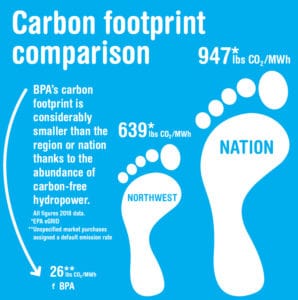Quick Fact: Ocean Health
OPALCO is committed to reducing carbon emissions for the health of the Salish Sea.
 Climate change is making our oceans warmer, more acidic and less productive.
Climate change is making our oceans warmer, more acidic and less productive.- Ocean acidification happens when our oceans absorb carbon dioxide. It threatens marine ecosystems world wide including our Salish Sea.
- The decrease in the ocean pH makes it harder for calcifying animals like the Dungeness crab to build and maintain shells and for fish like salmon to detect predators.
- Our oceans absorb nearly one-third of carbon dioxide emissions. The ocean has 30% more acidity than before the Industrial Revolution due to burning of fossil fuels (such as coal, gas, and oil) and deforestation.
- Warming waters are affecting marine wildlife worldwide. New reports come out daily about ocean acidification and declining or migrating fish and shellfish populations – salmon, lobsters, prawns, scallops, etc.
- Global warming threatens salmon in a variety of ways including young salmon that die when water warms above a certain threshold and warmer water streams that increase outbreaks of fish disease.
- OPALCO gets its power from PNGC/BPA, which is primarily generated through hydropower. “Hydro” is fueled by rainfall and snowpack, a clean and renewable resource with very low carbon emissions. Hydro is by far the best, cleanest source of baseload power for our ocean health. It’s 10 times cleaner than solar, 200 times cleaner than fossil fuels like oil and coal.
More info:
https://www.opb.org/news/article/study-northwest-salmon-ocean-acidification-disrupt-odor-predator/
https://www.climate.gov/news-features/understanding-climate/climate-change-ocean-heat-content



